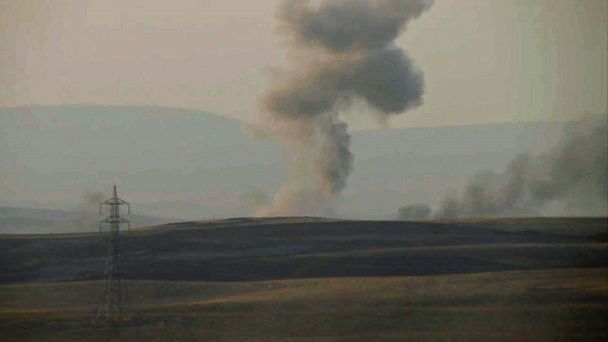Broad Backing for Air Strikes on ISIS; Less for US Forces as Advisers in Iraq

(AP Photo via AP video)
Seven in 10 Americans support air strikes against Islamic State insurgents in Syria, but far fewer back sending U.S. forces to Iraq as advisers - evidence in a new ABC News/Washington Post poll of the political risks of returning U.S. soldiers to that volatile region.
Fifty-three percent support sending U.S. forces to train Iraqi government troops and coordinate air strikes against Islamic State positions. But that's comparatively modest in terms of support for military action, and 17 percentage points behind the public's endorsement of air strikes.
See PDF with full results, charts and tables here.
The Obama administration's campaign against the Islamic State of Iraq and Syria includes placing U.S. advisers in Iraq to coordinate air strikes, and training of Iraqi forces may occur. The president - perhaps cognizant of broad public dismay with the U.S. intervention in Iraq under his predecessor, George W. Bush - has pledged not to engage U.S. forces in a combat role.
Obama himself has a 50 percent approval rating for handling the conflict with ISIS in this poll, produced for ABC by Langer Research Associates - far from stellar but exceeding the 44 percent who disapprove. It's also more than the 42 percent approval of his handling of the situation in Iraq in June and August, before U.S.-led air strikes were extended to ISIS positions in Syria.
Notably, Obama receives approval from 30 percent of Republicans and 38 percent of conservatives for his handling of the situation - well short of majorities, but also far above his overall job approval ratings from those groups, 10 and 19 percent, respectively, in an ABC/Post poll in early September. He also gets 45 percent approval from political independents for handling the confrontation with ISIS, 8 points better than his overall job rating from this group.
ACTION - The results on military action align with longstanding public attitudes on military intervention, with lower-risk air strikes far preferred than more-committing ground combat. Support for military action also can rely on the presence of a clear threat - which the public sees in ISIS (six in 10 in early September called it a "very" serious threat to U.S. vital interests) - and broad international participation, which Obama has worked to achieve.
Among groups, support for air strikes is almost the same among men and women, at 72 and 69 percent, respectively, despite customarily higher support for military action among men. Support for sending U.S. forces in an advisory role reverts to form, dropping by 11 points among men but further, by 23 points, among women.
There are risks for Obama; sending advisers is least popular among some of his core support groups, including half or fewer of nonwhites, liberals, younger and lower-income adults, as well as women. Young adults, age 18 to 29, also are comparatively skeptical about air strikes - 55 percent support them, vs. 80 percent of those age 50 and older.
Regardless of divisions about advisers on the ground, the poll indicates the level of public antipathy toward ISIS. Support for air strikes against the group in Iraq started at 45 percent in June, rose to 54 percent in August and then to 71 percent in early September, when 65 percent also said they'd support extending those strikes to Syria. With that air campaign now underway, its 70 percent support reflects a broad level of agreement in fractious political times.
METHODOLOGY - This ABC News/Washington Post poll was conducted by landline and cell phone Sept. 24-28, 2014, in English and Spanish, among a random national sample of 1,001 adults. Results have a margin of sampling error of 3.5 points. The survey was produced for ABC News by Langer Research Associates of New York, N.Y.